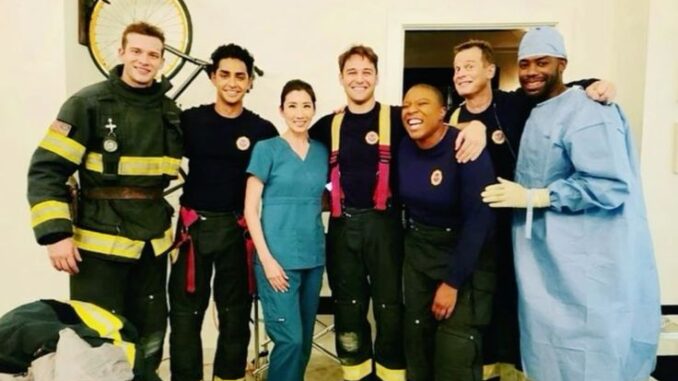
Introduction: A Shocking Announcement
Fans of 9-1-1: Lone Star were taken aback when news broke of the show’s unexpected cancellation. As the spin-off to the successful 9-1-1 series, it had garnered a dedicated fanbase with its thrilling storylines and diverse cast of characters. The cancellation felt abrupt, leaving many wondering why such a beloved show had come to an end. In a recent interview, Ryan Murphy, the creator and visionary behind the show, opened up about the decision, sharing insights into the journey of 9-1-1: Lone Star and what ultimately led to its cancellation.
The Success of 9-1-1: Lone Star: A Groundbreaking Series
When 9-1-1: Lone Star premiered, it brought a fresh perspective to the procedural drama genre. Set in Austin, Texas, the show followed Owen Strand, played by Rob Lowe, as he led a diverse team of firefighters and first responders. Unlike many other shows in the genre, Lone Star embraced inclusion and diversity, featuring characters from various racial, ethnic, and LGBTQ+ backgrounds. Murphy explained that this diversity was intentional, as he wanted to reflect the world we live in today and give audiences a wide range of characters they could relate to.
Ryan Murphy’s Vision: A Show with Heart
For Murphy, 9-1-1: Lone Star wasn’t just about the action-packed rescue missions and emergencies. It was about the characters’ personal journeys and struggles, which he felt were at the heart of the show. He emphasized how the show tackled real-world issues, such as racism, homophobia, and mental health, and how these themes resonated deeply with the audience. In his interview, Murphy expressed his pride in creating a show that not only entertained but also sparked meaningful conversations.
Murphy noted that he wanted Lone Star to highlight the everyday heroes who risk their lives to save others, while also showing their vulnerabilities and the emotional toll that comes with the job. Characters like Owen, who battled cancer, and Paul Strickland, a Black transgender firefighter, represented the human side of these first responders. The creator believed that these stories made 9-1-1: Lone Star stand out from other shows, as it was unafraid to delve into topics that others might shy away from.
The Road to Cancellation: Behind-the-Scenes Challenges
Despite the show’s success, Murphy revealed that there were significant behind-the-scenes challenges that ultimately led to its cancellation. One of the biggest hurdles was financial. The cost of producing 9-1-1: Lone Star had risen substantially over the seasons, particularly due to the large ensemble cast and the high-stakes action sequences that the show had become known for. While the show maintained strong ratings, it wasn’t enough to justify the rising costs, especially in an increasingly competitive television landscape.
Murphy also mentioned that the changing dynamics in the streaming world had an impact on the show’s future. With the rise of streaming platforms and shifting viewer habits, networks are under more pressure than ever to deliver immediate, high ratings. Unfortunately, 9-1-1: Lone Star fell victim to these changes, despite its dedicated fanbase. Murphy acknowledged that while the show still had more stories to tell, the decision to cancel it was largely out of his hands.
Fan Reactions: A Heartfelt Goodbye
The announcement of 9-1-1: Lone Star‘s cancellation left fans devastated. Social media was flooded with tributes to the show, with fans expressing their sadness and disappointment. Many pointed to the show’s representation and how it made them feel seen and heard. Murphy shared that he was touched by the outpouring of love and support from fans. He mentioned that while it was difficult to say goodbye to a show that meant so much to him, he was grateful for the impact it had during its run.
Murphy also acknowledged the incredible cast and crew who brought 9-1-1: Lone Star to life. He spoke highly of Rob Lowe, who not only starred in the show but also served as an executive producer. According to Murphy, Lowe’s passion for the show was evident from day one, and his leadership both on and off screen helped make the series the success it was. Murphy praised the rest of the cast as well, noting how they brought depth and authenticity to their roles.
The Legacy of 9-1-1: Lone Star
Though 9-1-1: Lone Star has come to an end, its legacy lives on. The show broke new ground in terms of representation and storytelling, and it leaves behind a lasting impact on the television landscape. Murphy reflected on the significance of the show, stating that he hoped it would inspire other creators to continue pushing for more inclusive and diverse stories.
Murphy also hinted that while Lone Star may be over, it might not be the last time we see these characters. While he didn’t confirm any specific plans, he left the door open for potential spin-offs or revivals in the future. “These characters have so much more to give,” he said, “and who knows? There might be another opportunity down the road to revisit them.”
Conclusion: A Bittersweet Farewell
The cancellation of 9-1-1: Lone Star marks the end of a unique and heartfelt show that captured the attention of viewers around the world. While fans may mourn the loss, Ryan Murphy’s candid reflections offer some comfort, as he shared his own emotional connection to the show and its characters. As Murphy continues to create groundbreaking television, 9-1-1: Lone Star will be remembered as a series that not only entertained but also inspired, challenged, and moved its audience.
The end of this chapter is bittersweet, but as Murphy himself said, “It’s never really over.” And for fans of 9-1-1: Lone Star, that sentiment holds hope for the future.